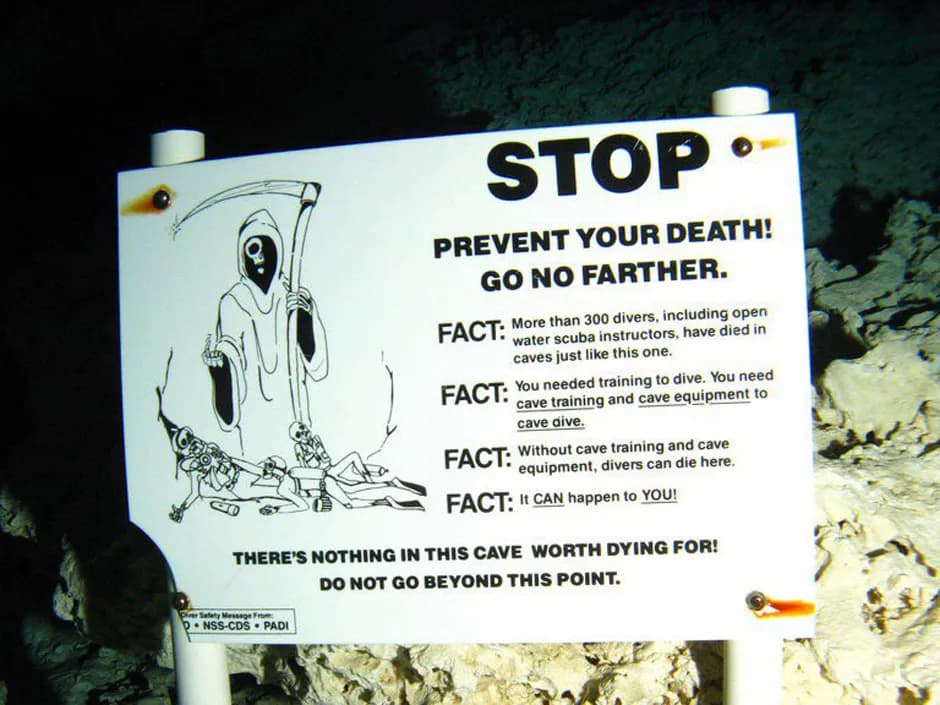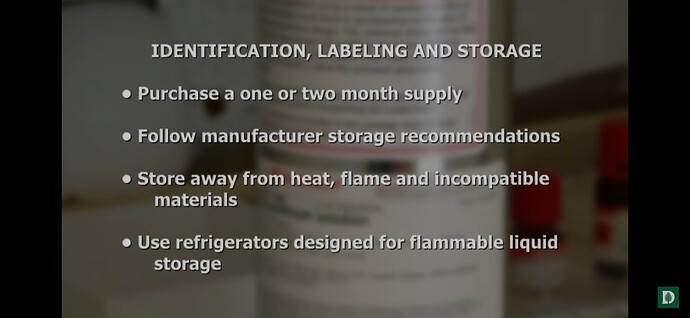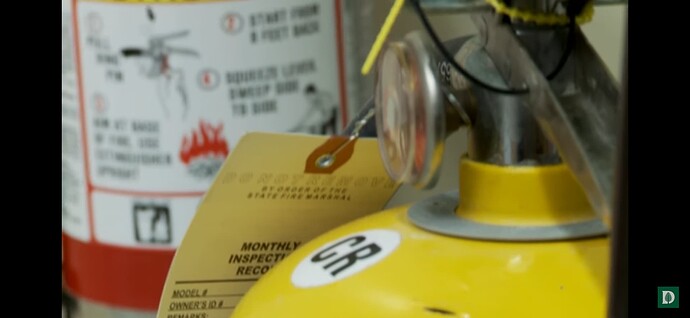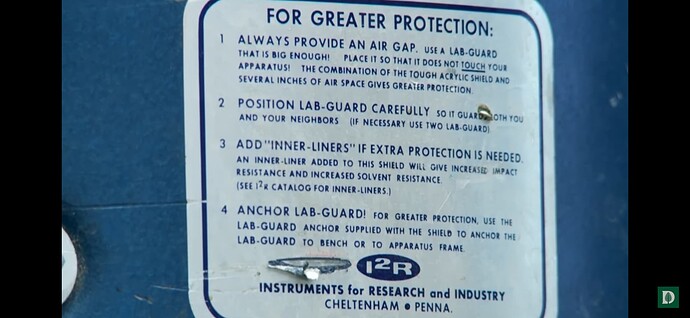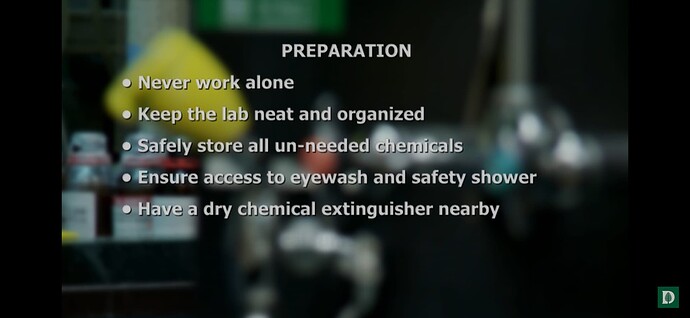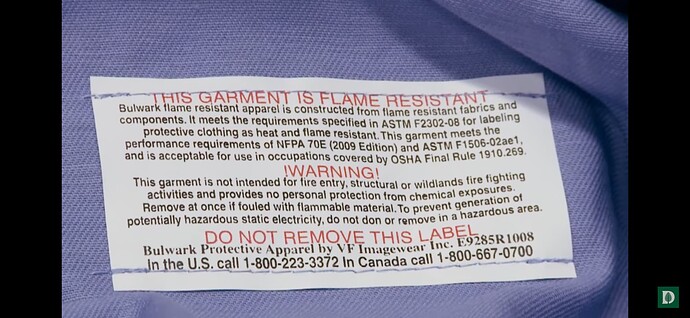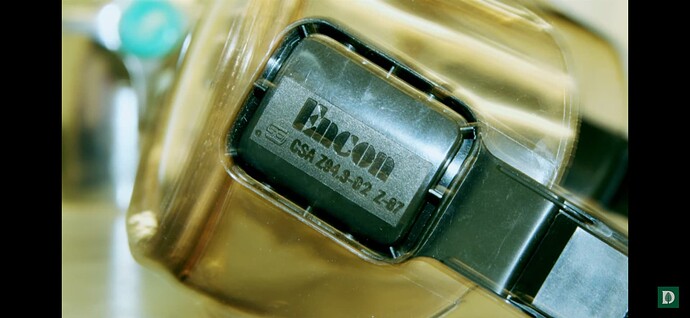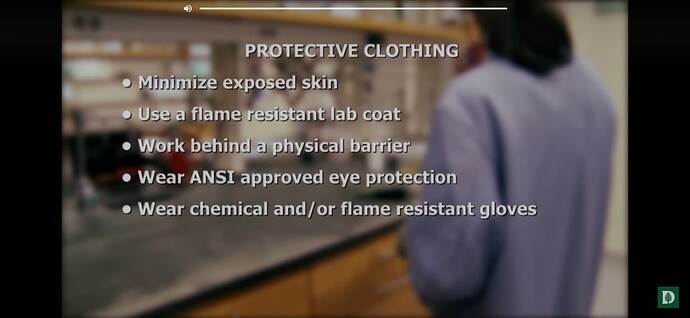There was a plant in Memphis when I lived there that made acrylic monomer from sodium cyanide. Solid cyanide’s path of most concern is through the skin. Absorption is slow. Someone came in one weekend and violated the buddy system by working alone. Their containment suit had a rip in the back and they never knew it. They just laid down and went to sleep and were found the following monday.
That’s exactly why “gatekeeping” isn’t effective, only education and training are.
Reminds me of my very first experience with lab safety not being followed.
My undergrad Orgo 2 class lab partner had the burette stopcock configured wrong during titrations and had a few mL’s of ethyl acetate sprayed directly into both eyes. Her eye protection was slightly lower than it should’ve been while trying to get a good look at the setup. She looks over to me, I see solvent literally pouring from her eyes. Sprang into action, rushed her over to the eyewash station and feared for the worse.
We were very relieved to see in MSDS that it only caused eye irritation. If we had been doing acid-base titrations, it would’ve been a much different story.
This story is nothing compared to the other experiences in this thread dealing with hydrogenation and catalysis — But I firmly believe every experiment/reaction and situation thereafter should be handled with the same respect, patience and understanding. Treat even the most simple of reactions with the utmost respect to laboratory safety. Chemistry is very much akin to Cave-diving, for those who know its dangers.
“Know your limits and dive often.”
We were always told never to do it alone, but unfortunately, that’s always the first rule to be broken.
Not that accidents in the lab happens more frequently when working alone, but if one happens, there’s no one there to save/help you.
Reminds me of a tradition at Uppsala University in Sweden. Once a year, the Chemistry Department threw a party which included wrapping a couple of pounds of sodium in newspaper and throwing the bundle into the body of water flowing through town.
It was called Natrium Festen (The Sodium Party) and was abandoned since one year in 1980s, I think it was, the wind shifted unexpectedly and a big “cloud” of lye drifted into a parking lot resulting in severe damage to many of the parked cars’ paint jobs.
My ex-wife taught organic. They had pre-lab quizzes for safety about the specific experiment to be done and if you didn’t get 100% you were denied entry to the lab. Too many stupid people showing up without having ever read the experiment and hurting themselves and others demanded it.
Personally I’ve regularly used aqua regia and piranha solution, done some hydrofluoric etching, used oxy-hydrogen torches, and my only incident was when I had to make nitric oxide to calibrate a sensor and I blew up the glassware apparatus I rigged together. I was wearing ppe and on the other side of a hood vent sash when it happened.
Treat chemistry the same way you treat firearms. Always. The interesting thing about chemistry is that unusual shit. An BECOME a weapon.
We are fucked
We were never required to wear a lab coat.
Typically, lab coats are a little ill fitting with chance of your sleeve getting caught in glassware, particularly when you need to act quick to avert disaster. The important thing is not to wear clothes you care too much about, and wear fabrics that are naturally fire resistant.
Open toe shoes were a big no-no, but Birkenstock sandals were quite common. You’re on your feet most of the day and need something comfortable.
Develop a good relationship with your fumehood and keep it relatively clean. In chemistry you need elbow room.
US government: What’r we gonna do with all this sodium?
Also US government: (rips a fat line) “throw it in a lake!”
Makes me wonder what they did with all that LSD the Army Corp was playing with.
“I just don’t understand where all these damned hippies came from?”. (Laughs in prankster)
Lab coats are great because you can get them off your body quickly
Buy a flame resistant one and wear it. Roll up the sleeves or cut them but at least your covered with a layer you can get off you
Also I was required to wear steel-toed boots with the lace hooks or bungees that can also be removed quickly but you won’t immediately burn a hole in your feet if you drop or spill on them. You need your feet to run to safety ![]() They’re great for moving large drums too
They’re great for moving large drums too
Stay safe
I’d also suggest wearing natural fibers, cotton/wool aren’t going to melt to your skin and continue to burn
And make sure you finish your safety cigarettes BEFORE you enter the work place…
Rolling up sleeves = ice burns
Speaking from a newly scarred experience

Also a good reason to wear them down. Borrow your home dude’s hair tie and Cinch it ![]()
Lmao my date was ike omg scar twins
Watch the video ![]()
![]()
And they are a layer of clothing you can allow to get repeatedly dirty. But the need for them to be something to quickly shed, by necessity means that they are slightly bigger in size.
The times when the sleeve got caught in an Erlenmeyer, toppling over something you really didn’t wanna spill, are too many.
It comes down to what you are doing, what chemicals you are working with. And wearing a coat can be oppressively hot and irritating.
It’s very much a personal choice and wearing clothing you’re not afraid to burn an acid hole in. To each his/her/their own.
